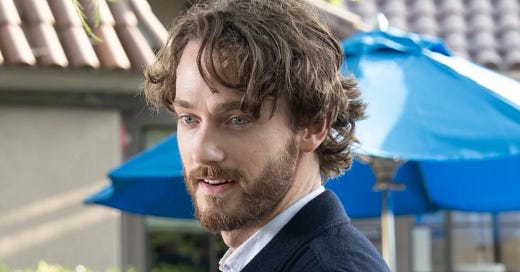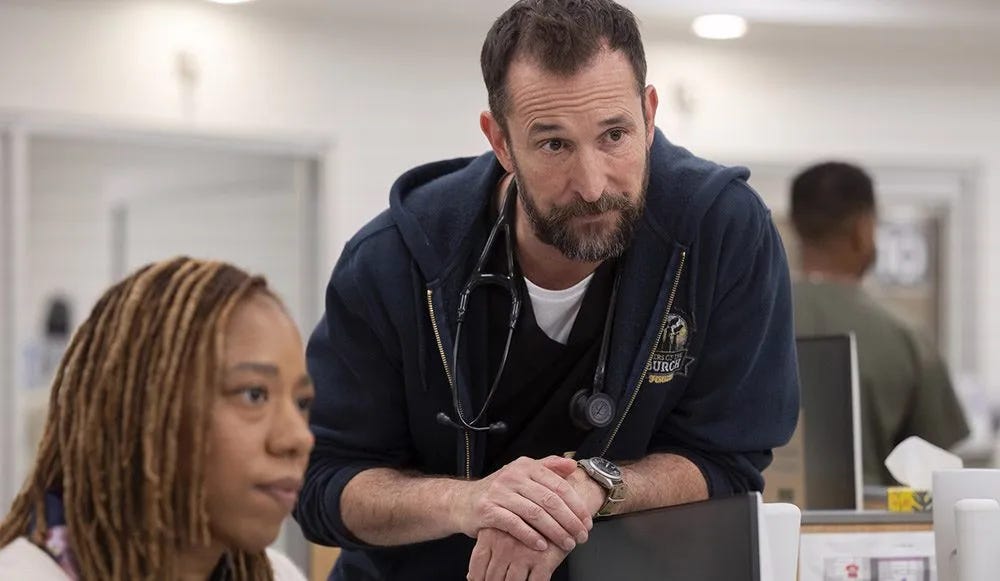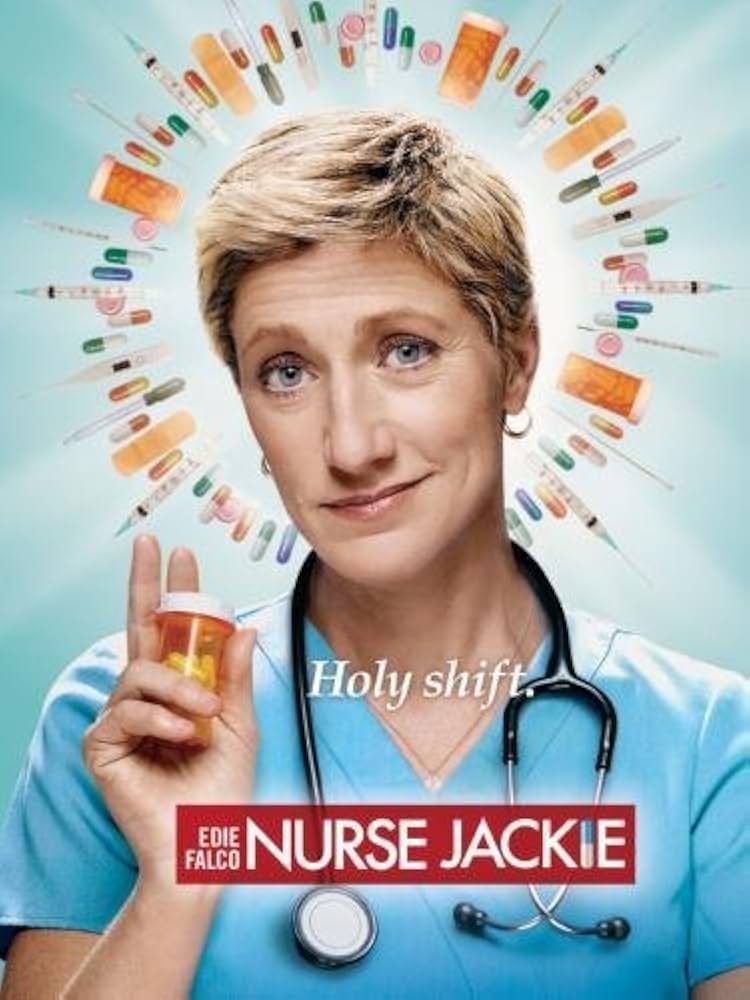Episode 1001: Why Don’t Hospital Shows Have Chaplains?
When it comes to hospital casts, why do TV writers ignore this important job?
POP CULTURE SPIRIT WOW
Hi and welcome back to Pop Culture Spirit Wow, now in its 10th year, which is hard to believe.
Today I’ve got a little piece about TV medical shows. Over the weekend I binged the first four episodes of the new E.R.-like show The Pitt on HBO. It’s fantastic. But it got me thinking about a character you never see on TV, and I’m not sure why.
This fall saw the debut of a new character on Grey’s Anatomy, James Morgan, whose represents a bit of a landmark for the series: He is the first chaplain to appear in the show’s 21-year history.
Michael Thomas Grant as Episcopal minister-with-great-hair James Morgan.
While that may sound surprising, if you step back and think about it, when was the last time you saw a chaplain on any other TV hospital show, other than perhaps as a background character? New Amsterdam had one for an episode, but he was a patient, just as E.R. did a wonderful four-episode stint about a dying bishop. Chicago Hope? The Good Doctor? House? St. Elsewhere? Scrubs? Nothing that I can remember.
The NBC hospital comedy St. Denis Medical apparently has one, “Chaplain Steve,” who has so far appeared in two episodes. Near the end of its 15-year run, E.R. did have a chaplain character for 7 episodes.
James Morgan unfortunately only lasted about the same before being written out. It turns out, the character had only brought on to give longtime character Dr. Levi Schmitt his happy ending. The two fall in love, Levi gets a big fellowship and the two leave Grey Sloan Memorial forever-ish.
On The Pitt, there’s no chaplain as of yet, though there is a social worker, Kiara Alfaro (Krystel V. McNeil, with Wyle above). But in a way Dr. Robbie has been written to fill the role of chaplain. While running the most nightmarish E.R. in Pittsburgh (we’re told most people will sit waiting to be seen 8 hours minimum; it has a very “E.R. in Gotham City” vibe), he’s got time to look after his staff, oversee new doctors, and do end of life pastoral counseling with families, even being there as they say their goodbyes. (In episode 4 he gave a simple suggestion on how to say goodbye to a loved one that has got to be some of the best pastoral advice I’ve ever heard.)
Which is great! It’s just, that’s not how things normally work in a hospital. Hospitals have social workers and chaplains whose whole job is to be with patients and their friends and families and to help them work through the difficult and painful emotions and questions they’re dealing with. It’s a big job, and given what they confront each day a dramatic one, too, which should make it attractive to TV producers.
Also, as Grey’s showed in its one real pastoral care outing with Morgan, chaplains come at things from a different point of view than doctors, which creates the potential for interesting conflicts.
So why don’t TV shows use them?
1) Religion
I think if we dig very deep, this is a big part of the issue. Though many Americans continue to signal that they are believers of one faith or another, secular media is generally anxious when it comes to anything religious. Some of that is distrust borne of things like the way religious leaders sometimes treat people; some is anxiety about the potential of unintentionally offending a community of believers. The last thing any TV show wants is an entire religious community of people coming after them for a mistake they made.
And some of it is just a lack of understanding. People often don’t feel confident when it comes to religion, even when that religion is their own. And trying to get comfortable can feel like it would involve a lot of effort, maybe more than it’s worth.
Complicating all this further is the fact that unless you’re doing a show about chaplains, you’re likely going to have just one character who is “the” chaplain. So which faith do you choose to represent?
The TV workaround is that you create a character who has studied in a number of different religious traditions and draws on all of them. Maybe he’s an atheist for good measure. (There are in fact chaplains for atheists.) It’s a little untrue, but I could see a show running with something like that, especially one like The Pitt where the hospital is understood to be financially strapped.
2) Chaplains Don’t Cut
The thing about doctors and nurses is, they save lives and they also lose them. There’s no beating that in terms of drama, personal growth, or conflict.
In truth the chaplain’s situation is its own high-wire act. You’re dealing with ticking clocks, big existential questions, and potentially so much family drama. And though you can’t kill a patient, you can do serious harm to them or to their family. But still, cutting does seem like it provides much higher stakes.
3) Medical Professional as Saint is already a Trope
While there are plenty of shows out there that have made a meal of the selfishness of doctors, the idea of a doctor or nurse as a noble spiritual wisdom figure is pretty deeply-embedded. E.R. had Mark Greene, Carol Hathaway, Abby Lockhart; Grey’s Anatomy has Miranda Bailey and Richard Webber; St. Elsewhere had a whole raft of priest-like doctors, with the kindly Dr. Westphal leading the way. Nurse Jackie even created religious iconography for its lead character.
The fact that these same figures are the ones doing the lifesaving (and sometimes failing at that) also makes their lives more complicated, which from a TV writer’s point of view is the ideal. More complication=more conflict=more drama=more eyeballs=Yes, queen.
4) Maybe Chaplains are seen as the Midwest of Hospital Staffers?
Have you ever heard a story about a vicious hospital chaplain? Or one who is in the profession totally for themselves? It almost sounds like a joke, doesn’t it?
And yet I’m sure chaplains are just as damaged as the rest of us, messing up and/or trying to do good, which is the heart of most medical storylines. It’s just not as obvious, which can make it easy to overlook them or write them off. What stories could they possibly offer? They’re clearly absurdly nice people.
Fixing that assumption is pretty simple, of course: Just talk to a chaplain.
As I said, The Pitt is just four episodes in, each of which represents the next hour of Robbie’s 15-hour work day. With its interest in realism, maybe eventually we’ll see a chaplain character. I’d certainly love to see a hospital show explore what such a character could bring.
I suspect it would only add to the storytelling; it might also help viewers to understand what someone in that role can offer when they or their loved ones find themselves in similar situations.
I’ll be back later this week!







He’s not recent but what about Fr Mulcahy on M*A*S*H?
Maybe you should write a pilot show called Holy Shift